Last Dance Blu-ray Movie
HomeLast Dance Blu-ray Movie 
Mill Creek Entertainment | 1996 | 103 min | Rated R | Aug 23, 2011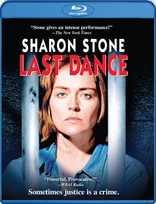
Movie rating
6.2 | / 10 |
Blu-ray rating
| Users | 0.0 | |
| Reviewer | 3.0 | |
| Overall | 3.0 |
Overview
Last Dance (1996)
Convicted killer Cindy Liggett has been sitting on death row for twelve years. Now, after numerous appeals and stays, Cindy is ready to face the inevitable. But a new hire from the Clemency Board becomes convinced that errors in Cindy's original trial led to an unjust sentence.
Starring: Sharon Stone, Rob Morrow, Randy Quaid, Peter Gallagher, Jack ThompsonDirector: Bruce Beresford
| Crime | Uncertain |
| Drama | Uncertain |
Specifications
Video
Video codec: MPEG-4 AVC
Video resolution: 1080p
Aspect ratio: 1.78:1
Original aspect ratio: 1.85:1
Audio
English: DTS-HD Master Audio 2.0
Discs
25GB Blu-ray Disc
Single disc (1 BD)
Playback
Region A, B (C untested)
Review
Rating summary
| Movie | 3.0 | |
| Video | 3.5 | |
| Audio | 1.5 | |
| Extras | 0.0 | |
| Overall | 3.0 |
Last Dance Blu-ray Movie Review
Well Meant
Reviewed by Michael Reuben October 19, 2011A signature role can overshadow an actor's career, forever shading the public's perception and making it difficult (or impossible) for the actor to play someone different. Under the old studio system, that kind of public perception became an asset, as properties were tailored to a star's persona. But since the demise of the old studios, budding stars usually balk at typecasting and try to stretch. They want to be Actors (with a capital "A"). After the success of 1992's Basic Instinct, Sharon Stone was clearly trying to outrun the giant shadow of Catherine Tramell, the gorgeous, bisexual, ice-cold blonde she'd so convincingly brought to life opposite Michael Douglas. Catherine was largely a male fantasy (and nightmare) dreamed up by writer Joe Eszterhas and director Paul Verhoeven, but Stone embodied her so vividly that the two became intertwined. (And anyone who thinks Catherine wasn't just as much a creature of Eszterhas and Verhoeven need only look at the misbegotten Basic Instinct sequel to see how short Stone fell without their inspiration.) For the rest of the Nineties, Stone struggled to do something different, with varying degrees of success. Last Dance was one of Stone's biggest stretches. Deglammed and distraught, she played a death row inmate who has exhausted her string of appeals and stays, in a story whose narrative arc resembled the previous year's Dead Man Walking. Despite good efforts from all involved, including Australian director Bruce Beresford, the film never pierces the heart in a way that it must if it wants to shake up whatever notions (in either direction) a viewer may have about the administration of capital punishment.
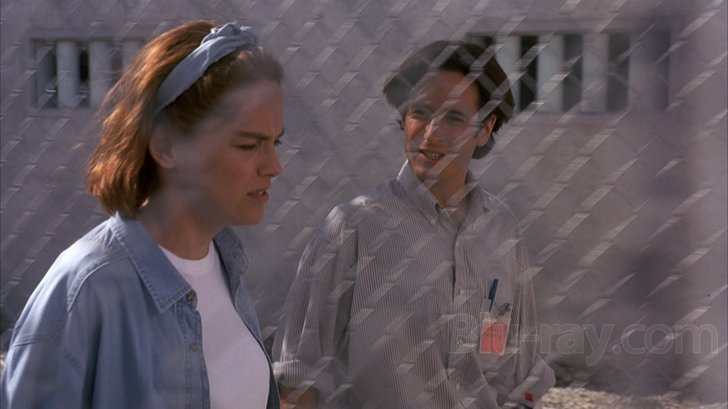
The anti-hero of Last Dance is Rick Hayes (Rob Morrow), a young lawyer with a privileged upbringing and a checkered past that is gradually revealed as the film progresses. After a few years off "finding himself", Rick comes to work in the capital of an unnamed southern state (the film was shot in Tennessee and South Carolina) where his older brother, John (Peter Gallagher), is assistant to the governor (Jack Thompson). There's more than a hint of disapproval in John's attitude toward his younger brother, and he assigns Rick to the Clemency Board under Sam Burns (Randy Quaid). It's a position where Rick can't do much damage, because clemency petitions in death penalty cases receive top priority for review, and this governor has never granted clemency to a defendant sentenced to die. Sam Burns is fully occupied with the high-profile case of John Henry Reese (an uncredited Charles S. Dutton), a convicted murderer who turned his life around while in prison and wrote a best-selling New York Times autobiography. Burns gives Rick the file on Cindy Liggett (Stone), which he considers a formality. Liggett was an orphan and troubled teen, who'd taken to burglarizing houses with her boyfriend, Doug (Don Harvey). One such house was the home of a girl she knew from school, Debbie Hunt (Rachel Glass) -- only the house wasn't empty, as Cindy and Doug thought. Debbie and her boyfriend were spending the night there on the sly. When everything was over, they were dead, beaten to a pulp. In exchange for leniency, Doug testified that Cindy did it, and her court-appointed attorney barely offered a defense. Cindy doesn't want to talk to Rick initially, but she slowly relents when he exhibits the persistence of an eager newcomer ("the crusader complex", as Sam Burns calls it). The "dance" of the title refers to the careful steps that Rick and Cindy take toward each other over the course of the film until, by the end, they're sufficiently synchronized to have made a connection. They begin with very different goals. After twelve years of delay, Cindy is weary of legal maneuvering. She's well aware that the boy for whose murder she was convicted was the son of a wealthy and well-connected construction magnate, William J. McGuire (John Cunningham), who will do everything he can to ensure her execution. And she's accepted responsibility for what happened that night, which she recalls in vivid flashes of memory that, when collated with crime scene photos and other evidence, eventually give us the entire story. What Cindy wants more than anything now is to wind up her affairs, such as they are: to say goodbye to her brother (Skeet Ulrich), to make peace with herself, and to have one friendly pair of eyes to meet in the witness room while the state is putting her to death. Rick wants to keep Cindy alive, even though that means life in prison. He's convinced something was missed during the trial, something that would have swayed the jury not to impose the death penalty. He combs the file, reinterviews every potential witness, interrogates the defense lawyer, even accosts the governor at a formal political event. When Rick's passion gets him thrown off the case, he keeps investigating, and eventually he does find something that looks irregular. But is it enough to change the outcome? Rob Morrow is a likable presence, and he's well-suited to convey the conflicting elements in Rick. When Rick insists to his older brother that none of what he's doing is motivated by sibling rivalry, Morrow makes him sound utterly sincere, and yet, like John, you don't believe him. You can also understand Rick's romantic appeal to Jill (Jayne Brook), another staffer, although both the relationship and the subplot go nowhere. But it's Stone's Cindy on whom the film depends, and despite Stone's best efforts, you're always aware that this is a performance, when what's needed is a person: vital, angry, resentful, afraid, above all still dangerous. A comparison to Sean Penn's portrayal of a convicted rapist and murderer in Dean Man Walking may be unfair, but it's also unavoidable, given the proximity of the release dates. Penn's Matthew Poncelet was often creepy and even intimidating; as Penn and Susan Sarandon's Sister Helen fenced over repentance, you saw repeated glimpses of the man who committed the crimes for which Poncelet was sentenced to die, and the glimpses felt real. Last Dance isn't able to show you the equivalent, although it labors mightily to do so. Maybe Stone didn't yet know how to reach those places, or maybe she didn't have the right director. (It's worth noting that, in the previous year's Casino, with Martin Scorsese's help, she'd plumbed some intense and extreme emotional depths on screen, and was nominated for an Oscar as a result.) It must also be said that the ending of Last Dance feels like a cheat, in that its focus is almost entirely on Rick. The only reason for telling a story that examines in such detail the mechanisms by which someone is placed on death row and what happens once they arrive there is to leave the audience with questions about capital punishment and its administration. The script by Ron Koslow (creator of Beauty and the Beast and Moonlight) appears to be heading in that direction, but at the last minute it chickens out.
Last Dance Blu-ray Movie, Video Quality 
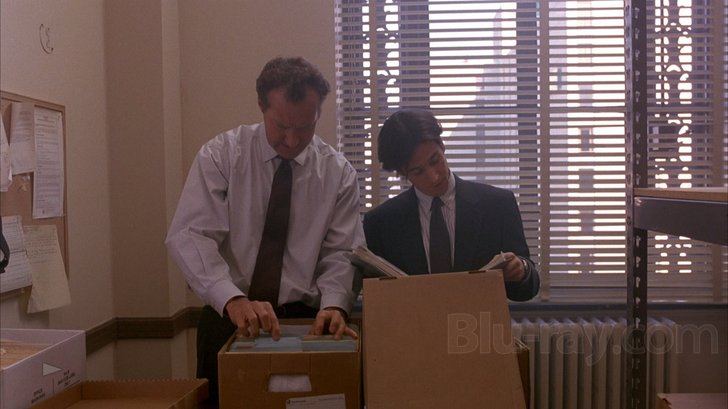
Mill Creek has supplied a 1080p, AVC-encoded image with respectable detail and black levels, decently saturated colors, a naturalistic palette, and a small but film-like amount of grain. (The cinematographer was Peter James, who had previously worked with director Beresford on the Oscar-winning Driving Miss Daisy.) There is an occasional slight shimmer in portions of the frame that betrays the transfer's analogue origins, but otherwise this is one of Mill Creek's better efforts visually, effectively conveying Beresford's frequent strategy of isolating individuals in the frame with expanses of barren space around them. (This is surely one of the least crowded prisons in America.) I saw no evidence of high-frequency filtering, transfer-induced ringing, compression artifacts or other inappropriate digital tampering.
Last Dance Blu-ray Movie, Audio Quality 
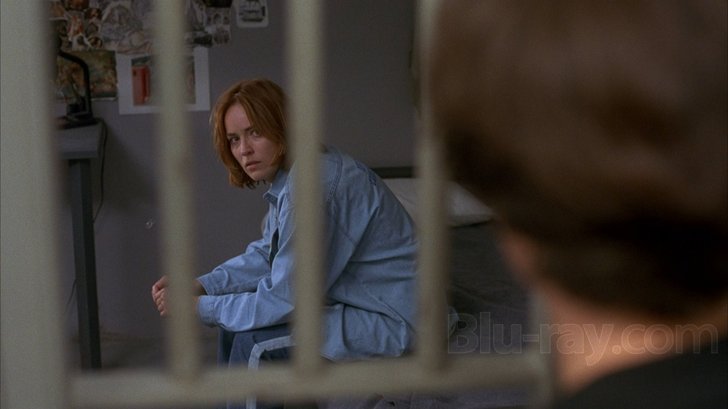
The Blu-ray's soundtrack is the customary Mill Creek format of DTS-HD MA 2.0, although the box states "English 2.0 Dolby Digital". The film's end credits list the "Spectral Recording" Dolby Digital logo, which was the common mark for a DD 5.1 film in the mid Nineties; so it's likely that a 5.1 track exists. It should have been provided. The existing stereo track conveys the dialogue clearly and reproduces Mark Isham's score effectively. There's isn't anything more that can be said of it.
Last Dance Blu-ray Movie, Special Features and Extras 
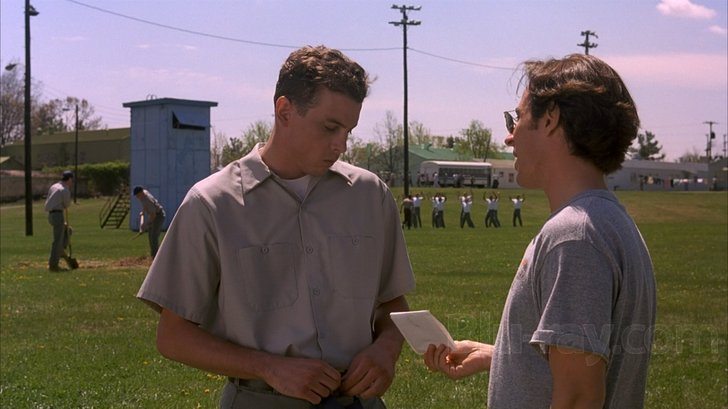
As always with Mill Creek, none.
Last Dance Blu-ray Movie, Overall Score and Recommendation 

I can't recommend Last Dance to add to your library, but it's certainly worth a rental. The film holds your attention, and the issues it explores haven't dated and certainly haven't gone away.
Similar titles
Similar titles you might also like

Too Young to Die?
1990

True Story
2015

The Wannabe
2015

Murder, She Wrote: The Last Free Man
2001

The Power of Few
2013

Jamesy Boy
2014

Weeds: The Complete Collection
Limited Edition
2005-2012

Empire
2002

Wild Horses
2015

Knockaround Guys
2001

Money for Nothing
1993

Stand Up Guys
2012

Murder, She Wrote: The Celtic Riddle
2003

Above the Rim
1994

Just Cause
1995

Oz: Complete Series - Seasons 1 - 6
1997-2003

Las Vegas: The Complete Series
2003-2008

Carlito's Way 4K
1993

JCVD
2008

Misconduct
2016
